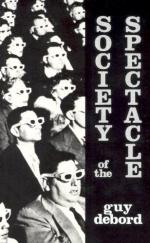
|
| Name: _________________________ | Period: ___________________ |
This test consists of 5 multiple choice questions, 5 short answer questions, and 10 short essay questions.
Multiple Choice Questions
1. The spectacle is quintessentially dogmatic, yet produces no solid _______, in Chapter 3.
(a) Dogma.
(b) Leader.
(c) Reality.
(d) Truth.
2. According to thesis 21, what is a social necessity?
(a) Learning.
(b) Respecting.
(c) Loving.
(d) Dreaming.
3. Which of the senses does Debord believe the spectacle can manipulate the most?
(a) Touch.
(b) Scent.
(c) Hearing.
(d) Sight.
4. In the quote from Red Flag at the beginning of Chapter 3, there is the proletarian conception and the _________ conception.
(a) Socialist.
(b) Communist.
(c) Bourgeois.
(d) Dictator
5. What science did the Utopians take as their model?
(a) Astrology.
(b) Economics.
(c) Astronomy.
(d) Anthropology.
Short Answer Questions
1. In the least industrialized regions, Debord believes dictatorships are felt in the form of what?
2. In thesis 16, Debord refers to the spectacle as a what?
3. The dynamism of capitalism is ruled by things that are what, in Chapter 3?
4. What does Debord say every Chinese person must study?
5. Who does Debord say delivered his own funeral oration in a sense?
Short Essay Questions
1. What are the paradoxes of the spectacle, as described at the end of Chapter 3?
2. What is the spectrum of the spectacle that Debord describes?
3. What effect did education of the proletariat have on revolution, according to Debord?
4. What role did Hegel have in interpreting the world?
5. How has the spectacle evolved from a state of being to a state of appearing, according to Debord?
6. What is the relationship between commodity and consumption within the spectacle, according to Chapter 3?
7. What are the byproducts of celebrity, according to Chapter 3?
8. What three things does the spectacle become, as explained in thesis 3?
9. What does Debord mean when he says that the spectacle should be viewed as "a weltanschauung"?
10. How does the spectacle "epitomize the prevailing model of social life," according to Debord?
|
This section contains 670 words (approx. 3 pages at 300 words per page) |

|




